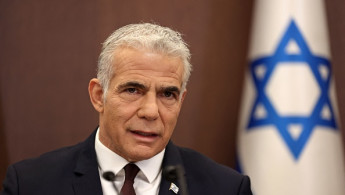PM Lapid claims Lebanon 'recognises' Israel with sea border deal
Prime Minister Yair Lapid on Thursday claimed Israel's foe Lebanon de-facto "recognises" the Jewish state, due to a sea border deal the two states are set to sign imminently.
"This is a political achievement - it is not every day that an enemy state recognises the State of Israel, in a written agreement, in front of the entire international community," Lapid said.
The premier was speaking at the opening of a cabinet meeting convened to formally approve the deal, hours ahead of the expected signing by the two parties of separate copies of the agreement.
"The State of Israel won today. In security, economically, diplomatically, and in energy," Lapid said.
Lebanese President Michel Aoun said the deal would not change the foreign policy of his country, which officially remains in a state of war with Israel.
In a palace statement after he signed the agreement, Aoun said it would have "no political dimensions or impacts that contradict Lebanon's foreign policy."
Lebanon and Israel agree on a flawed but necessary maritime deal
— The New Arab (@The_NewArab) October 22, 2022
✍ Joe Macaron https://t.co/7AvrYCr4Rw
The final accord is due to be signed at the headquarters of the United Nations Interim Force in Lebanon in the southern border town of Naqoura, in the presence of US mediator Amos Hochstein and the UN's special coordinator for Lebanon Joanna Wronecka.
The deal was hailed by US President Joe Biden as a "historic breakthrough" on Wednesday.
"It took principled and persistent diplomacy to get it done," Biden said, during a meeting in Washington with his Israeli counterpart Isaac Herzog.
Washington has played a key role in mediating the lengthy negotiations between Israel and Lebanon, who remain technically still at war after numerous conflicts between the two sides.
Israel has recently signed a number of controversial normalisation deals with Arab states the UAE, Bahrain, Morocco, and Sudan, which have been widely slammed by Palestinians and others in the region.





 Follow the Middle East's top stories in English at The New Arab on Google News
Follow the Middle East's top stories in English at The New Arab on Google News


